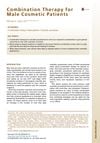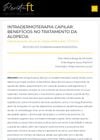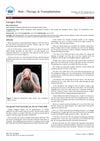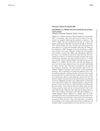2 citations,
November 2018 in “PubMed” Androgenetic alopecia slightly affects quality of life but can significantly impact self-esteem and social interactions for some.
[object Object]  1 citations,
March 2023 in “Scientific Reports”
1 citations,
March 2023 in “Scientific Reports” Finasteride may increase the risk of suicide or severe self-harm in men with mood disorders but not in the general population.
 1 citations,
November 2017 in “Dermatologic clinics”
1 citations,
November 2017 in “Dermatologic clinics” Combination therapies can improve hair loss treatment results and boost self-confidence in men.

Hair intradermotherapy effectively treats hair loss and boosts self-esteem.
 March 2017 in “InTech eBooks”
March 2017 in “InTech eBooks” Acne vulgaris is a common skin condition that can cause low self-esteem and depression, and early treatment is important to prevent scarring.
 January 2015 in “Hair therapy & transplantation”
January 2015 in “Hair therapy & transplantation” Hair restoration greatly improved George's confidence and self-identity.
 January 2013 in “Springer eBooks”
January 2013 in “Springer eBooks” Hair care products are important for appearance and self-esteem, and choosing the right ones can help maintain healthy hair.
 35 citations,
January 2000 in “Dermatology”
35 citations,
January 2000 in “Dermatology” Hair loss common in Norwegian men, affecting self-esteem and life quality.
30 citations,
March 2012 in “Journal of Analytical Toxicology” THCCOOH levels in hair decrease from root to tip and don't match well with self-reported cannabis use.
17 citations,
October 2001 in “Veterinary dermatology” The skin issues in the two dogs might be caused by infection or self-injury, not genetics.
16 citations,
February 2014 in “Iranian Red Crescent Medical Journal” Polycystic Ovary Syndrome (PCOS) affects Iranian women's feelings of femininity and self-image.
 8 citations,
January 2015 in “Scars, burns & healing”
8 citations,
January 2015 in “Scars, burns & healing” Hair transplantation effectively treats burn scar alopecia, improving self-esteem and confidence.
6 citations,
May 2017 in “Nursing standard” The document concludes that PCOS is a complex condition that can reduce fertility and affect self-esteem, but it can be managed with various treatments.
5 citations,
August 2018 in “Journal of Nepal Medical Association” Androgenetic alopecia has a minor effect on quality of life but can significantly impact self-esteem and social interactions for some people.
4 citations,
January 2014 in “The Journal of urology/The journal of urology” Kidney cancer cells without folliculin are more sensitive to radiation due to increased self-eating cell death.
 1 citations,
May 2010 in “Nursing Standard”
1 citations,
May 2010 in “Nursing Standard” Treatments for autoimmune hair loss have limited success and patients need emotional support and self-acceptance.
[object Object]  June 2023 in “British journal of dermatology/British journal of dermatology, Supplement”
June 2023 in “British journal of dermatology/British journal of dermatology, Supplement” Madam C.J. Walker became the first self-made female millionaire in the USA by creating a successful hair care product for Black women.
 January 2023 in “DIGITAL HEALTH”
January 2023 in “DIGITAL HEALTH” Most men using teledermatology for hair loss treatment saw improved hair and self-esteem, with some experiencing side effects.
January 2022 in “The Pan African medical journal” Hypertrichosis causes excessive hair growth and needs psychological support due to its impact on self-esteem.
July 2022 in “DOAJ (DOAJ: Directory of Open Access Journals)” Androgenetic alopecia is common, affects self-image, and has no complete cure yet.
112 citations,
January 2004 in “The International journal of developmental biology” Feather patterns form through genetic and epigenetic controls, with cells self-organizing into periodic patterns.
 58 citations,
September 1991 in “British Journal of Dermatology”
58 citations,
September 1991 in “British Journal of Dermatology” Women with AGA often face anxiety, depression, and low self-esteem; psychological support is important.
22 citations,
December 2011 in “British journal of dermatology/British journal of dermatology, Supplement” Over 40% of women have unwanted facial hair, which can affect their self-image, and should be managed with personalized treatment and support.
 15 citations,
May 2004 in “Facial Plastic Surgery Clinics of North America”
15 citations,
May 2004 in “Facial Plastic Surgery Clinics of North America” New techniques in hair restoration surgery can fix unnatural results from old methods, improving patient self-esteem.
 13 citations,
December 1991 in “Annals of the New York Academy of Sciences”
13 citations,
December 1991 in “Annals of the New York Academy of Sciences” Researchers created a lab model to study human hair growth, showing it can grow and self-regulate outside the body.
 1 citations,
January 2024 in “International Journal of Advanced Research in Science, Communication and Technology”
1 citations,
January 2024 in “International Journal of Advanced Research in Science, Communication and Technology” Herbal hair scrubs can effectively prevent and treat hair problems, boosting self-confidence.
 1 citations,
October 2021 in “PubMed”
1 citations,
October 2021 in “PubMed” A woman had temporary hair loss after scalp surgery, which is a rare but self-healing condition that surgeons should recognize to avoid wrong treatment.
 February 2024 in “Asian journal of medical sciences”
February 2024 in “Asian journal of medical sciences” Proper hygiene, adequate sleep, and self-care can reduce common skin diseases.
 June 2023 in “Brazilian Journal of Health Review”
June 2023 in “Brazilian Journal of Health Review” Common baldness is a hereditary condition that can be treated with medications or surgery to prevent progression and improve self-esteem.

COVID-19 may be linked to hair loss called Telogen Effluvium, affecting quality of life and self-esteem.


















